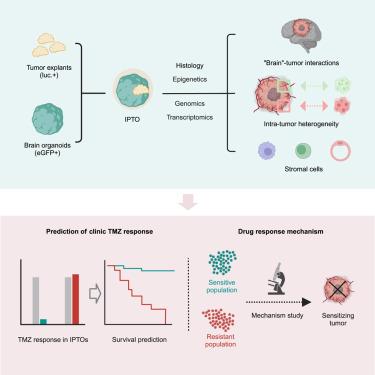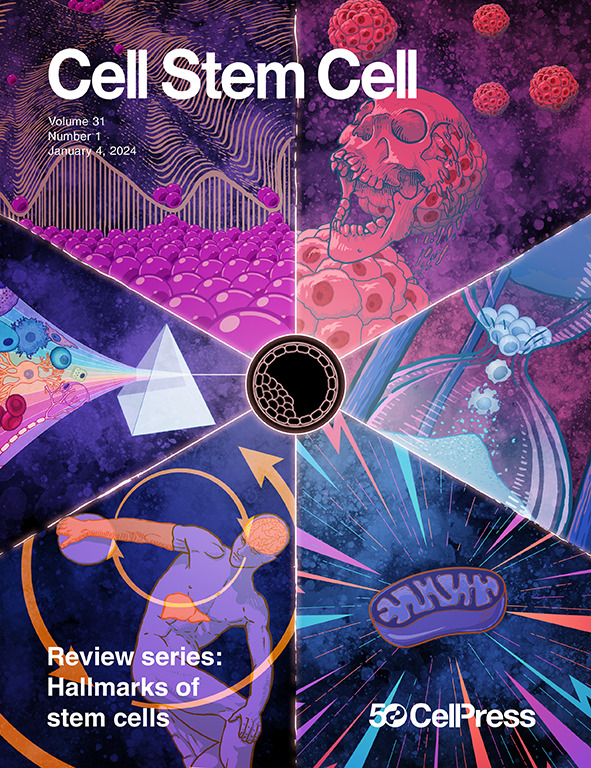Individualized patient tumor organoids faithfully preserve human brain tumor ecosystems and predict patient response to therapy
IF 19.8
1区 医学
Q1 CELL & TISSUE ENGINEERING
引用次数: 0
Abstract
Tumor organoids are important tools for cancer research, but current models have drawbacks that limit their applications for predicting response to therapy. Here, we developed a fast, efficient, and complex culture system (IPTO, individualized patient tumor organoid) that accurately recapitulates the cellular and molecular pathology of human brain tumors. Patient-derived tumor explants were cultured in induced pluripotent stem cell (iPSC)-derived cerebral organoids, thus enabling culture of a wide range of human tumors in the central nervous system (CNS), including adult, pediatric, and metastatic brain cancers. Histopathological, genomic, epigenomic, and single-cell RNA sequencing (scRNA-seq) analyses demonstrated that the IPTO model recapitulates cellular heterogeneity and molecular features of original tumors. Crucially, we showed that the IPTO model predicts patient-specific drug responses, including resistance mechanisms, in a prospective patient cohort. Collectively, the IPTO model represents a major breakthrough in preclinical modeling of human cancers, which provides a path toward personalized cancer therapy.

个体化患者肿瘤类器官忠实地保存人类脑肿瘤生态系统并预测患者对治疗的反应
肿瘤类器官是癌症研究的重要工具,但目前的模型存在缺陷,限制了它们在预测治疗反应方面的应用。在这里,我们开发了一个快速,高效,复杂的培养系统(IPTO,个体化患者肿瘤类器官),准确地概括了人类脑肿瘤的细胞和分子病理。患者来源的肿瘤外植体在诱导多能干细胞(iPSC)来源的脑类器官中培养,从而能够培养广泛的中枢神经系统(CNS)人类肿瘤,包括成人、儿童和转移性脑癌。组织病理学、基因组学、表观基因组学和单细胞RNA测序(scRNA-seq)分析表明,IPTO模型再现了原始肿瘤的细胞异质性和分子特征。至关重要的是,我们证明了IPTO模型在前瞻性患者队列中预测了患者特异性药物反应,包括耐药机制。总的来说,IPTO模型代表了人类癌症临床前建模的重大突破,为个性化癌症治疗提供了一条途径。
本文章由计算机程序翻译,如有差异,请以英文原文为准。
求助全文
约1分钟内获得全文
求助全文
来源期刊

Cell stem cell
生物-细胞生物学
CiteScore
37.10
自引率
2.50%
发文量
151
审稿时长
42 days
期刊介绍:
Cell Stem Cell is a comprehensive journal covering the entire spectrum of stem cell biology. It encompasses various topics, including embryonic stem cells, pluripotency, germline stem cells, tissue-specific stem cells, differentiation, epigenetics, genomics, cancer stem cells, stem cell niches, disease models, nuclear transfer technology, bioengineering, drug discovery, in vivo imaging, therapeutic applications, regenerative medicine, clinical insights, research policies, ethical considerations, and technical innovations. The journal welcomes studies from any model system providing insights into stem cell biology, with a focus on human stem cells. It publishes research reports of significant importance, along with review and analysis articles covering diverse aspects of stem cell research.
 求助内容:
求助内容: 应助结果提醒方式:
应助结果提醒方式:


